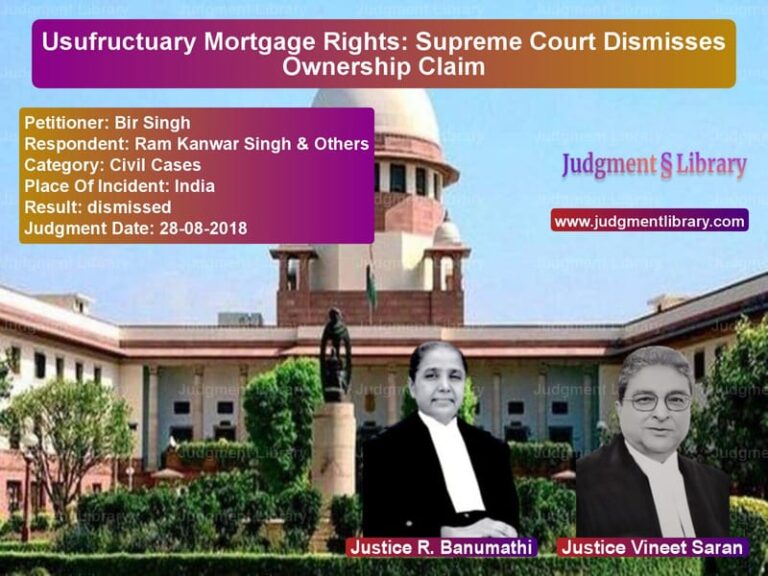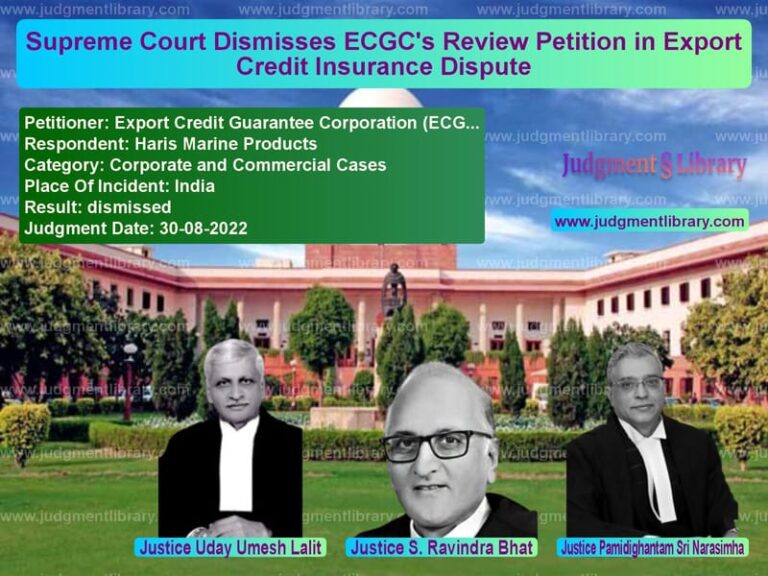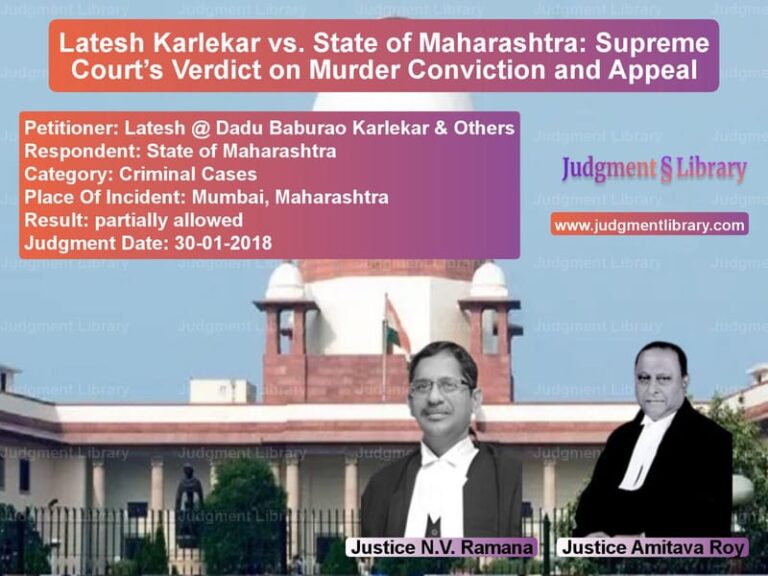Election of Mohd. Abdullah Azam Khan Declared Void: Supreme Court Upholds High Court Judgment
The Supreme Court of India recently delivered a crucial judgment in the case of Mohd. Abdullah Azam Khan v. Nawab Kazim Ali Khan, addressing the eligibility of a candidate to contest elections under Article 173(b) of the Constitution. The case centered on whether the appellant was below the minimum age required to contest the Uttar Pradesh Legislative Assembly elections. The Court upheld the Allahabad High Court’s ruling, declaring the appellant’s election void.
The controversy stemmed from the 2017 Uttar Pradesh Legislative Assembly elections in the 34-Suar Assembly Constituency, District Rampur. The appellant, Mohd. Abdullah Azam Khan, was declared the winning candidate. However, his opponent, Nawab Kazim Ali Khan, challenged his election on the ground that he was below the age of 25 years at the time of filing his nomination. The High Court ruled in favor of the election petitioner, leading to this appeal before the Supreme Court.
Background of the Case
The nomination process for the Uttar Pradesh Legislative Assembly elections was initiated on 25th January 2017. During the scrutiny of nomination papers on 28th January 2017, the election petitioner raised an objection stating that Mohd. Abdullah Azam Khan was below the age limit of 25 years as mandated by Article 173(b) of the Constitution. The objection was overruled by the Returning Officer, allowing him to contest the election. The appellant went on to secure the highest votes and was declared the winner on 11th March 2017.
Following this, the election petitioner filed a case before the Allahabad High Court, arguing that the appellant’s birth records indicated he was born on 1st January 1993, making him ineligible to contest the election. The High Court ruled in favor of the election petitioner, annulling the election results, prompting the appellant to challenge the decision before the Supreme Court.
Petitioner’s Arguments
The election petitioner, Nawab Kazim Ali Khan, contended:
- The appellant was born on 1st January 1993, making him ineligible under Article 173(b) of the Constitution to contest the election in 2017.
- The nomination papers should have been rejected by the Returning Officer, but they were wrongly accepted.
- Official documents, including the appellant’s school records, Class X mark sheet, passport applications, and bank records, all indicated his date of birth as 1st January 1993.
- The birth certificate issued by Nagar Palika Parishad, Rampur, in 2012 recorded his birth date as 1st January 1993.
- The appellant had later sought a duplicate birth certificate from the Lucknow Nagar Nigam in 2015, where his birth date was altered to 30th September 1990.
Respondent’s Arguments
The appellant, Mohd. Abdullah Azam Khan, defended his election by arguing:
- His actual birth date was 30th September 1990, as per a birth certificate issued by Queen Mary’s Hospital, Lucknow, and confirmed by Nagar Nigam, Lucknow, in 2015.
- His school records mistakenly recorded 1st January 1993, an error made by a family friend at the time of school admission.
- His passport and school certificates carried the incorrect birth date due to this mistake.
- He had filed an application for rectification of his date of birth in his school records, but the process was delayed.
- The High Court failed to consider the direct testimonies of his mother and hospital authorities confirming his birth in 1990.
Supreme Court’s Analysis
The Supreme Court meticulously examined the documentary and oral evidence, analyzing whether the appellant was qualified under Article 173(b). The Court made key observations:
1. School and Government Records
“The academic records, including the Class X certificate issued by CBSE, consistently recorded the date of birth as 1st January 1993.”
The Court found that throughout his school life, his official birth date remained 1st January 1993, and no evidence supported the claim that this was an error made at admission.
2. Passport and Identification Records
“The appellant’s multiple government-issued documents, including passports and bank records, repeatedly confirmed his birth date as 1st January 1993.”
The Court noted that the appellant applied for multiple passports where he voluntarily provided his birth date as 1st January 1993.
3. Alleged Rectification in 2015
“The birth certificate issued by Lucknow Nagar Nigam in 2015 was secured much later, around the time the appellant became active in politics.”
The Court expressed doubt about the credibility of the 2015 birth certificate, which was issued nearly 25 years after birth, particularly when all previous records stated a different birth date.
Final Judgment
After reviewing the evidence, the Supreme Court upheld the High Court’s judgment, ruling:
“We affirm the conclusion of the High Court that the appellant was ineligible to contest the elections under Article 173(b) of the Constitution. The election of the appellant is declared void.”
Consequently, the appeal was dismissed, and the Supreme Court confirmed the annulment of Mohd. Abdullah Azam Khan’s election.
Conclusion
This judgment reinforces the necessity of strict compliance with eligibility criteria in electoral processes. It underscores the importance of maintaining authentic records and ensuring that electoral candidacy requirements are met beyond doubt. The ruling serves as a precedent for future election-related disqualification cases, ensuring that constitutional mandates are upheld in electoral processes.
Petitioner Name: Nawab Kazim Ali Khan.Respondent Name: Mohd. Abdullah Azam Khan.Judgment By: Justice Ajay Rastogi, Justice B.V. Nagarathna.Place Of Incident: Rampur, Uttar Pradesh.Judgment Date: 07-11-2022.
Don’t miss out on the full details! Download the complete judgment in PDF format below and gain valuable insights instantly!
Download Judgment: nawab-kazim-ali-khan-vs-mohd.-abdullah-azam-supreme-court-of-india-judgment-dated-07-11-2022.pdf
Directly Download Judgment: Directly download this Judgment
See all petitions in Legislative Powers
See all petitions in Public Interest Litigation
See all petitions in Judgment by Ajay Rastogi
See all petitions in Judgment by B.V. Nagarathna
See all petitions in dismissed
See all petitions in supreme court of India judgments November 2022
See all petitions in 2022 judgments
See all posts in Election and Political Cases Category
See all allowed petitions in Election and Political Cases Category
See all Dismissed petitions in Election and Political Cases Category
See all partially allowed petitions in Election and Political Cases Category







